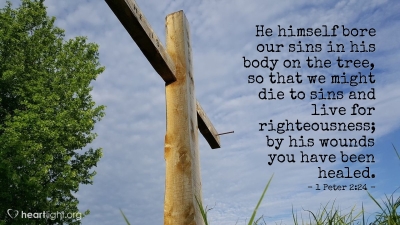I think it is fair to say that anyone who reads (and believes) the Bible is aware that human beings experience, and live with, the consequences of their sins. Cain, in Genesis, is a prime example. His ‘iniquity’ in Genesis 4:8 leads directly to his being estranged. Just two chapters further on in Genesis 6, we read that “the wickedness of humanity” caused an earthly corruption that resulted in the flood. In the New Testament, Paul writes in Romans 6:23 that “the wages of sin are death”. It is very clear that sin’s negative influence presents a hugely significant issue for people.
Sin’s impact on God
However, does human sin impact God in any way? I would suggest the answer is yes, in as much as the physical burdens that weigh down humans, as a result of sin, can become so heavy that they cannot be borne by people. When this happens, and people cry out to the Lord, then Scripture tells us that God Himself takes on that burden in heaven. You see a sign of this in Exodus 33 where Moses demands that God goes with the Israelites. Moses will not settle for an angel, he wants God Himself (Ex 33:12-17). My sense is that we find the reason for this in Exodus 34:9, when Moses speaks to God: “if I have found favour in your eyes, then let the Lord go with us. Although this is a stiff-necked people, forgive our wickedness and our sin, and take us as your inheritance.” Moses knows full well that an angel will not forgive sins, but his experience of God is that He is full of forgiveness – a quality that the Israelites desperately need. It is this quality of holy ‘sin-bearing’ that provides the precedent for Jesus shouldering the weight of the sins of humanity – our sins.
An unbearable burden
Cain is the first person to experience sin as a burden, and he articulates that when he says, after he had murdered Abel, “My iniquity (עון; avon) is too great (גדול; gadol) to bear (נשא; nasa)” (Gen 4:13). Though many modern scholars would interpret Cain’s problem as a psychological one—akin to stress or grief being “too much to bear”—the Hebrew words describe a physical reality. Rendered literally, Cain is complaining that the weight of his “sin is too big to carry.” This is paralleled in Exodus where even stubborn, immovable Pharoah gets to the stage where he knows that his transgression engenders a life-threatening burden. When God sends the plagues against Egypt, Pharaoh says to Moses and Aaron, “Carry (נשא; nasa) my sin (חטאתי; hatati) … and plead with the Lord your God to remove this death from me” (Ex 10:17). I would suggest that these examples demonstrate that sin is a death-dealing force that enters the world and overloads humanity.
My perception of this is that when iniquities become too numerous for our human shoulders to bear, then God feels the impact. When Ezra tells God that “our iniquities have risen higher than our heads and our guilt has mounted up to the heavens” (Ezra 9:6), he’s not just speaking hyperbolically, or metaphorically. The build-up of human sin can become so substantive that we need God to intercede simply to lift the load. We gain a sense of this in Isaiah, when God declares, “I cannot endure iniquity (און; aven) and solemn assembly. Your new moons and your appointed feasts… have become a burden (טרח; torach) to me [that] I am weary (נלאיתי; nileti) of carrying (נשא; neso’)” (Isa 1:13-14). The prophet Jeremiah writes that the Babylonian exile came about because “the Lord could no longer carry (לשׂא; laset) your evil deeds and abominations…. therefore, your land has become a desolation” (Jer 44:22). The prophetic imagery deployed here suggests that the weight of human sin falls from God’s shoulders in heaven and scatters God’s people on earth.
Jesus – crushed by our iniquities
Based on this conception of divine willingness to take on the burden of sin, it should be no surprise that God’s son, Jesus, confronts this same problem on the cross. In a direct reference to Isaiah 53’s suffering servant (such a powerful reference that to this day orthodox Judaism proscribes this passage), Peter writes that Jesus “bore our sins in his body on the tree, so that we might die to sin and live to righteousness. By his wounds you have been healed” (1 Pet 2:24; cf. Isa 53:4-5). This powerful thinking from Peter follows God’s experience of bearing iniquity throughout the Old Testament. Sin kills humans, and the human sins that Jesus carries on the cross cause His own death.
You could say that at the cross, at Golgotha, the crushing weight of sin does its worst – but through Jesus’ choice to submit Himself to God’s will, this allows God to defeat sin at its own game.
Hallelujah! Jesus carried our burdens so that we no longer have to, releasing us to live our lives for Him.
